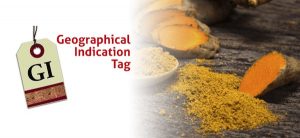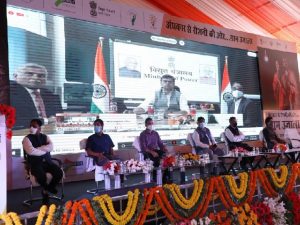Today Current Affairs: 30th December 2021 for UPSC IAS exams, State PSC exams, SSC CGL, State SSC, RRB, Railways, Banking Exam & IBPS, etc
Table of Contents
PLI Scheme For Textiles:

The Ministry of Textiles has said that it will accept applications from January 1 for the Production Linked Scheme for Textiles announced in September this year.
- The Government had launched the Production-Linked Incentive (PLI) scheme for the textiles sector worth Rs 10,683 crore.
- This is part of a larger PLI scheme for 13 sectors, with a total budgetary outlay of 1.97 lakh crore.
- The PLI scheme for textiles aims to promote the production of high value Man-Made Fibre (MMF) fabrics, garments and technical textiles.
- Any person or company willing to invest a minimum of Rs 300 crore in plant, machinery, equipment and civil works (excluding land and administrative building cost) to produce products of MMF fabrics, garments and products of technical textiles will be eligible to participate in the first part of the scheme.
- Investors willing to spend a minimum of Rs 100 crore under the same conditions shall be eligible to apply in the second part of the scheme.
- Under PLI, the Centre will subsidise eligible manufacturers by paying incentives on incremental production.
- Companies investing over Rs 300 crore in plant, machinery, equipment and civil works to produce the identified products will get an incentive of 15 percent of their turnover, which needs to be Rs 600 crore in the third year.
- The companies investing between Rs 100 crore and Rs 300 crore will also be eligible to receive duty refunds and incentives (lower than 15 percent of their turnover).
- The government expects to achieve “fresh investment of over Rs 19,000 crore and a cumulative turnover of more than Rs 3 lakh crore”.
- The PLI scheme will provide an immense boost to domestic manufacturing, and prepare the industry for making a big impact in global markets in sync with the spirit of Atmanirbhar Bharat.
- It will also help attract more investment into this sector.
New Vaccines Approved:

India has cleared two more covid vaccines and one pill.
- The two latest vaccines approved by drug regulator CDSCO are Corbevax and Covovax.
- CORBEVAX vaccine is India’s 1st indigenously developed RBD protein sub-unit vaccine against COVID19, Made by Hyderabad-based firm Biological-E.
- The Nanoparticle Vaccine, COVOVAX, will be manufactured by Pune-based firm Serum Institute of India.
- The anti-viral drug approved is Molnupiravir.
- With this approval, the number of Covid vaccines which have received emergency use authorisation in the country has increased to eight.
- So far six COVID-19 vaccines — Serum Institute’s Covishield, Bharat Biotech’s Covaxin, Zydus Cadila’s ZyCoV-D, Russia’s Sputnik V and the US-made Moderna and Johnson and Johnson — have received emergency use authorisation from the Indian drug regulator.
Apatani Weave:

An application seeking Geographical Indication (GI) tag for the Arunachal Pradesh Apatani textile product has been filed by a firm, Zeet Zeero Producer Company Ltd.
Apatani weave:
- The Apatani weave comes from the Apatani tribe living at Ziro, the headquarters of Lower Subansiri district.
- The woven fabric of this tribe is known for its geometric and zigzag patterns and for its angular designs.
- The tribe predominantly weaves shawls known as jig-jiro, and jilan or jackets called supuntarii.
- The people use leaves and plant resources for organic dyeing of the cotton yarns in their traditional ways. And only women folk are engaged in weaving.
- A GI is primarily an agricultural, natural or a manufactured product (handicrafts and industrial goods) originating from a definite geographical territory.
- Typically, such a name conveys an assurance of quality and distinctiveness, which is essentially attributable to the place of its origin.
- Once the GI protection is granted, no other producer can misuse the name to market similar products. It also provides comfort to customers about the authenticity of that product.
- The registration of a geographical indication is valid for a period of 10 years.
- It can be renewed from time to time for further period of 10 years each.
- In India, Geographical Indications registration is administered by the Geographical Indications of Goods (Registration and Protection) Act, 1999 which came into force with effect from September 2003. The first product in India to be accorded with GI tag was Darjeeling tea in the year 2004-05.
Gram Ujala Programme:

Convergence Energy Services Limited (CESL) has achieved a remarkable milestone of distributing 50 lakhs LED bulbs under Project Crore of their Gram Ujala programme.
- Gram Ujala scheme is being implemented in rural households in Bihar, Uttar Pradesh, Andhra Pradesh, Karnataka, and Telangana.
- CESL is providing high quality 7-Watt and 12-Watt LED bulbs with 3 years guarantee at a cost of INR 10 per bulb in exchange of working incandescent bulbs. Every household can exchange a maximum of 5 bulbs.
- The distribution has resulted in energy savings of 71,99,68,373.28 units per year with cost savings of 250 crores per year in the rural areas of aforementioned states.
- The programme is active till March 31, 2022.
- CESL is supported by C-Quest Capital in the entire distribution journey under SHINE programme.
Consumer Protection (Direct Selling) Rules, 2021:

Central Government in exercise of the powers conferred by clause (zg) of sub-section (2) of section 101 read with section 94 of the Consumer Protection Act, 2019 has notified the Consumer Protection (Direct Selling) Rules, 2021.
- These Rules shall apply to all goods and services bought or sold through direct selling, all models of direct selling, all direct selling entities offering goods and services to consumers in India, all forms of unfair trade practices across all models of direct selling.
- These Rules shall also apply to a direct selling entity which is not established in India, but offers goods or services to consumers in India.
- Existing direct selling entities need to comply of these rules within ninety days from the date of publication of these rules in the Official Gazette.
- The direct sellers as well as the direct selling entities using e-commerce platforms for sale shall comply with the requirements of the Consumer Protection (e-Commerce) Rules, 2020.
- Both direct selling entity and direct sellers are prohibited from promoting Pyramid Scheme or money circulation scheme.
- State Government must set up a mechanism to monitor or supervise the activities of direct sellers and direct selling entities.
- Direct selling entities will be liable for the grievances arising out of the sale of goods or services by its direct sellers.
Gig Workers:

The surge in demand for gig workers, particularly in the shared services and logistics segments, in the aftermath of the Covid-19 pandemic led to mushrooming of job discovery platforms.
- A gig economy is a free market system in which temporary positions are common and organisations contract with independent workers for short-term engagements.
- According to a report by Boston Consulting Group, India’s gig workforce comprises 15 million workers employed across industries such as software, shared services and professional services.
- An estimated 56% of new employment in India is being generated by the gig economy companies across both the blue-collar and white-collar workforce.
Different Collar Jobs
- Blue-Collar Worker: It is a member of the working class, who performs manual labour and earns an hourly wage.
- White-Collar Worker: It is a salaried professional, typically referring to general office workers and management.
- Gold-Collar Worker: It is used to refer to highly-skilled knowledge people who are highly valuable to the company.
- Example: Lawyers, doctors, research scientists, etc.
- Grey-Collar Worker: It refers to the balance of employed people not classified as white or blue-collar.
- Although grey-collar is something used to describe those who work beyond the age of retirement. Example: Firefighters, police officers, health care professionals, Security Guards, etc.
- Green-Collar Worker: It is a worker who is employed in the environmental sectors of the economy.
- Example: People working in alternative energy sources like solar panels, Greenpeace, World Wide Fund for nature, etc.
- Pink-Collar Worker: It is employed in a job that is traditionally considered to be women’s work and is often low-paid.
- Scarlet-Collar Worker: It is a term often used to refer to people who work in the pornography industry, especially women entrepreneurs in the field of internet pornography.
- Red-Collar Worker: Government workers of all types.
- Open-Collar Worker: It is a worker who works from home, especially via the internet.
Nuclear Submarine Alliance: AUKUS

Australia, the US and the UK signed an agreement allowing the exchange of sensitive “naval nuclear propulsion information” between their nations.
- It is the first agreement on the technology to be publicly signed since the three countries announced the formation of a defence alliance, AUKUS, to confront strategic tensions in the Pacific where China-US rivalry is growing.
- Under the AUKUS deal, Australia would obtain eight state-of-the-art, nuclear-powered but conventionally armed submarines capable of stealthy, long-range missions.
AUKUS
- In September 2021, the US announced a new trilateral security partnership for the Indo-Pacific, between Australia, the UK and the US (AUKUS).
- The major highlight of this arrangement is the sharing of US nuclear submarine technology to Australia.
- Its Indo-pacific orientation makes it an alliance against China’s assertive actions in the South China Sea.
- It will involve a new architecture of meetings and engagements between the three countries, as well as cooperation across emerging technologies (applied AI, quantum technologies and undersea capabilities).
- There is concern that AUKUS could leave a deep scar on US-EU relations and the North Atlantic Treaty Organisation (NATO), and weaken the international coalition in the Indo-Pacific.
- NATO was established by the North Atlantic Treaty (also called the Washington Treaty) of 4th April, 1949, by the United States, Canada, and several Western European nations to provide collective security against the Soviet Union.
- NATO’s primary goals are the collective defence of its members and the maintenance of a democratic peace in the North Atlantic area.
- France had cancelled a scheduled meeting of the foreign ministers of Australia, France, and India at the UN.
In the last couple of years, the trilateral has become an important element in the emerging Indo-Pacific architecture. But the cancellation of the meeting is a blow to the trilateral engagement. - It is not clear whether the QUAD and AUKUS will reinforce each other or remain mutually exclusive.
- There are some beliefs that the “Anglosphere nations” — which share common cultural and historical ties to the UK — inspire more confidence in each other.
- QUAD is a grouping of India, USA, Australia and Japan which aims to safeguard the interests of democratic nations in the Indo-Pacific region and address global challenges.




